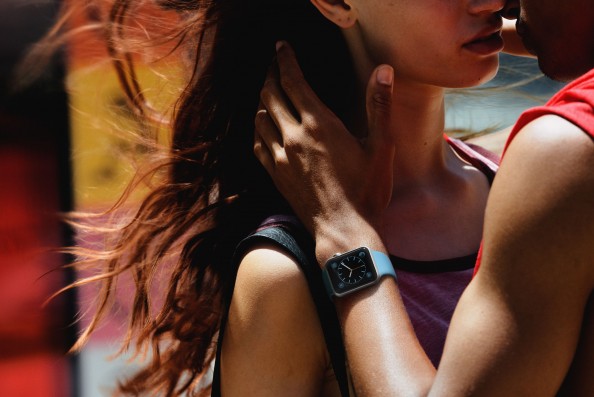This is an actual photo in the Apple page for the Sport edition of the Apple Watch. I’m not sure what kind of sport activity is displayed or in which manner the man on the right is aided by the watch. And this is the only photo of people using the Apple Watch on that page. It kind of says a lot about how Apple itself views it’s creation as a fitness accessory.
I started thinking more about this the last few days as I’ve been reading angry people’s comments on the official Fitbit community about Fitbit not integrating with HealthKit. Many are stating that they are going to get an Apple Watch instead. I’ve been thinking about the possibility myself ever since Apple’s announcement. So, here’s how Apple Watch is not a replacement for my Fitbit Force or for any other fitness tracker currently on the market.
My Fitbit (and other similar fitness tracking devices) have the following features
1) They track your steps
2) They track your sleep
3) Due to #1 and #2, you need wear them all day and all night
4) Due to #3, they need to resist tough use, the occasional bump and of course rain/snow
5) Also due to #3, they need to be every night (my Fitbit Force is 35g, the Jawbone UP is 19-23g http://jawbone.com/store/buy/up24 depending on the size)
5) Due to #4, they need to be relatively cheap so you’re not afraid to misuse them.
So how does Apple Watch score on these? Steps counting will be covered as has been announced. Sleep could also be tracked, although not from the Apple Health app (??). And that’s about it.
Sleep: On second thought, given that the battery life of Apple Watch is reported to be less than a full day, it means you are going to be charging it very night. So forget about wearing it during the night. On the other hand most fitness trackers last from several days to two weeks.
Price: the Apple Watch will be 3-4 times more expensive that most fitness trackers, starting at $349 for the Sport edition. FitBit trackers start at 60$, the current leading model (Flex) is at $99 and the JawBone UP are priced at $129. The difference is enormous.
Weight: In terms of weight, the exact figures of the Apple Watch are not announced, but given the big screen and much bigger casing, it could easily be 60-80 grams (the Moto 360 is 60 grams). That’s again 3-4 times what your average fitness trackers is.
Durability: Apple Watch is said to be water (possibly rain as well) resistant. However, that big screen is just waiting to be scratched. In comparison, the FitBit trackers have tiny screens and JawBone UP doesn’t even have one. JawBone UP is even shower-proof!
Heart rate monitoring: to be fair, Apple Watch will have a heart rate monitoring feature (using “infrared and visible-light LEDs and photodiodes” according to Apple) which most current fitness trackers don’t have (exception is the just announced Peak by Basis, available in November for $199. How good optical technology for HRM, is a matter for discussion though.
All in all, between a cheaper, lighter, more durable and more convenient option that can do more, with one that is none of the above, what would you choose? For me, probably both, but if I do get an Apple Watch (who am I kidding, I’m already saving up for it), it wont be to use it as a fitness tracker. :)
Tags: Apple, Apple Watch, Fitbit, fitness, fitness trackers, Health, Jawbone UP, Peak, technology





